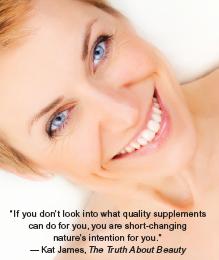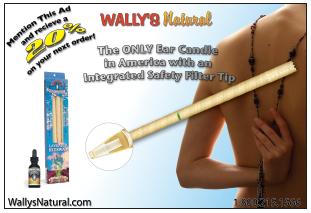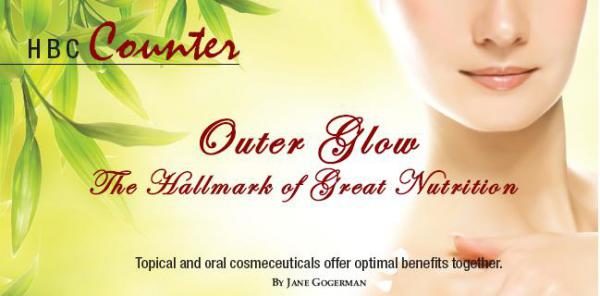The body works like an engine. If fueled with over-diluted, cheap products, our inner gears will eventually give out; and we’ll end up paying for it in the long run.
This principle is especially true for our skin, hair and nails—and not just what we apply topically. In fact, poor nourishment displays itself like red flags in the form of scaly skin, irritated scalp and brittle nails. Retailers must be keen to direct troubled customers to both topical products and cosmeceutical supplements to provide them with the utmost benefits they deserve.
It Takes Two To Tango
Getting a healthy glow, say experts, is a true inside–outside effort. Georgiana Donadio, Ph.D., founder and director of the National Institute of Whole Health in Boston, says, “Your skin is the fingerprint of what is going on inside your body, and all skin conditions, from psoriasis to acne to aging, are the manifestations of your body’s internal needs, including nutritional needs” (1).
Retailers, be sure to inform customers that cosmeceutical ingredient quality (and related research) is key when it comes to maintaining healthy and vibrant skin, hair and nails. Although genetics and our environment are forces we can’t change, you shouldn’t let them have ultimate power over you. Stores can guide customers to high-quality, beneficial supplements and topicals and have information explaining that using them together has a greater advantage than separately.
Again, relying on lotions and creams is just half of the equation. Says Kat James, author of The Truth About Beauty, “If you don’t look into what quality supplements can do for you, you are short-changing nature’s intention for you by denying yourself the most intuitive, therapeutic way to replenish yourself in this depleted and denatured world” (2).
James Meschino, D.C., M.S., author of The Wrinkle-Free Zone agrees on this point: ”Successful management of most skin conditions requires at the very least, complementary dietary and nutritional supplementation in addition to conventional topical treatments” (3).
By using the following cosmeceuticals daily, consumers can happily display their bouncy hair, smooth skin and strong nails.
• Skin experts say alpha-lipoic acid (ALA) can penetrate through oil and water, thus affecting skin cells from both inside and outside of the body (1). ALA is a powerful antioxidant, and since lipoic acid is fat soluble, it can help prevent free radical damage from occurring inside nerve cells (4). Also, due to ALA’s role as an antioxidant, it acts as an anti-inflammatory for your skin and can protect you against inflammation-related diseases like cardiovascular disease (4).
• Biotin is clustered in the B-complex group of vitamins and is present within our digestive system, where bacteria create this multi-purpose vitamin. “Greater attention is being paid to topical preparations containing B-vitamins. These creams can help give skin an almost instant healthy glow while hydrating cells and increasing overall tone” (1). The body uses biotin to break down fats and create new ones. Biotin also forms the basis of skin, nail and hair cells (1). Without enough biotin in their systems, clients you may experience hair loss (alopecia) or itchy, scaly skin (dermatitis). Some evidence indicates that biotin supplementation may “improve thin, splitting, or brittle toe and fingernails as well as strengthen hair” (5).
• Our brain naturally produces small amounts of DMAE, which can be helpful for skin health as an anti-aging ingredient. In a 2005 review of a double-bind clinical trial of a topical gel containing 3% DMAE, the nutrient seemed to increase the firmness of skin in 30 volunteers who applied the preparation to their faces daily for 16 weeks. The researchers also stated long-term application of DMAE gel is safe (6). DMAE may also improve memory lapses that happen due to aging, and can aid in anti-aging such as firming the skin, reducing lines on the forehead and around the eyes (6). Mary Sullivan, RN, co-founder of Olympian Labs stated in a recent article, ”DMAE also prevents the formation of lipofucsin, the brown pigment that becomes the basis for age spots” (1).
 • Astaxanthin, a red-carotenoid pigment found in seafood such as shrimp, crab, salmon and sea bream, supports skin health in supplement form. Findings from recent research include anti-aging benefits such as the suppression of UVB photo-induced wrinkles, a decrease in wrinkles and puffiness on the lower eye and cheeks, an increase in moisture for dry skin, delayed UV ray formation and skin regeneration (10).
• Astaxanthin, a red-carotenoid pigment found in seafood such as shrimp, crab, salmon and sea bream, supports skin health in supplement form. Findings from recent research include anti-aging benefits such as the suppression of UVB photo-induced wrinkles, a decrease in wrinkles and puffiness on the lower eye and cheeks, an increase in moisture for dry skin, delayed UV ray formation and skin regeneration (10).
• Hyaluronic acid (HA), also known as the almighty skin moisturizer, has notable properties that make it a vital substance to skin health. “HA is a conditionally essential nutrient, meaning that it’s more abundant in your skin when you’re younger, and it functions to keep skin youthful, smooth, toned and moist” (3). As we age, our HA level decreases, and we start to see wrinkles and fine lines. HA hydrates collagen, which keeps skin plump and toned. HA also lubricates joints so that knees, elbows, fingers and toes move smoothly and easily (1).
• Omega-3 and omega-6 essential fatty acids are very important for human bodies, especially the skin. These mega body boosters prevent the skin from drying and flaking (8). Omega-3s target heat regulation of skin, fat distribution, hair growth and blood circulation (8).
• With anti-aging on the rise, be sure to look for French maritime pine bark (pycnogenol) for your skin woes—especially those related to collagen. When collagen diminishes, so does the skin’s ability to be flexible and look youthful, thus allowing wrinkles and fine lines to develop. This extract binds to collagen, a major protein in skin, and protects it from various enzymes that break it down (9). Also, the extract is known to help the skin rebuild its thickness and elasticity, which promotes skin smoothness (9).
• A mineral by the name of silicon is essential for healthy bone structure, normal growth, collagen production and healthy skin, hair and nails (4). In a recent study of 50 women, half took silicon in a supplement form and the other half took a placebo. Astounding results confirmed that with supplementation “your body is making its own skin-firming collagen,” which keeps your skin looking youthful and moisture rich (10). Fine lines and wrinkles became less apparent, hair became stronger and more voluminous and thin nails became stronger and break-resistant (10).
• Look out for the antioxidant vitamin E, which protects skin cells from free radical damage that cause an increase in aging of the skin, age spots and genetic mutations to the skin’s DNA (3). By supplementing with vitamin E, you will experience benefits in your skin’s appearance, texture, how soft and smooth it is and reduced sun damage.
Retailers can take the initiative to create pamphlets with suggestions for addressing skin, hair and nail concerns. Also, stores can offer two-for-one product sales, with both a supplement and a topical. Remember though, the final result is up to the customer to complement a supplement with a topical, and be sure to keep up with daily physical activity and a healthy food regimen. WF
References
1. C. Bouchez, “Nutrients for Healthy Skin: Inside and Out,” www.webmd.com/skin-problems-and-treatments/features/skin-nutrition, accessed July 8, 2009.
2. K. James, The Truth About Beauty: Transform Your Looks And Your Life From the Inside Out (Beyond Words Publishing, Inc., Hillsboro, Oregon, 2003).
3. J. Meschino, The Wrinkle-Free Zone: Your Guide to Perfect Skin in 30 Days (Basic Health Publications, Inc., North Bergen, NJ, 2004).
4. R. Klatz, R. Goldman, The Official Anti-Aging Revolution: Stop The Clock: Time Is On Your Side For a Younger, Stronger, Happier You (Basic Health Publications, Inc., Laguna Beach, CA, 2007).
5. University of Maryland Medical Center, www.umm.edu/altmed/articles/vitamin-h-000342.htm, accessed July 8, 2009.
6. WholeHealthMD, www.WholeHealthMD.com, accessed July 8, 2009.
7. “Astaxanthin and Skin Health,” informational brochure provide by Fuji Health Science.
8. D. Rudin and C. Felix, Omega 3 Oils (Avery Publishing Group, Garden City Park, NY, 1996).
9. R.A. Passwater, All About Pycnogenol (Avery Publishing Group, Garden City Park, NY, 1998).
10. The Science of Beauty, informational booklet provided by Bio Minerals.
Published in WholeFoods Magazine, Sept. 2009









